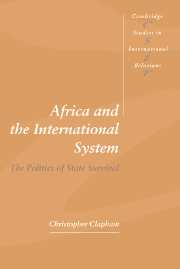Book contents
- Frontmatter
- Contents
- Acknowledgements
- List of acronyms and abbreviations
- Part I African states and global politics
- Part II Patterns of alliance
- 4 The Foreign Policies of Post-Colonialism
- 5 The politics of solidarity
- 6 The resort to the superpowers
- Part III Struggling with decay
- Notes
- Bibliography
- Index
- CAMBRIDGE STUDIES IN INTERNATIONAL RELATIONS 50
5 - The politics of solidarity
Published online by Cambridge University Press: 09 October 2009
- Frontmatter
- Contents
- Acknowledgements
- List of acronyms and abbreviations
- Part I African states and global politics
- Part II Patterns of alliance
- 4 The Foreign Policies of Post-Colonialism
- 5 The politics of solidarity
- 6 The resort to the superpowers
- Part III Struggling with decay
- Notes
- Bibliography
- Index
- CAMBRIDGE STUDIES IN INTERNATIONAL RELATIONS 50
Summary
African states: allies or rivals?
Those African rulers who sought to supplement or displace their dependence on the former colonial power had an obvious alternative source of diplomatic support in their relations with one another. Some of them, such as Kwame Nkrumah of Ghana, had already been closely involved in the Pan-African movement, and associated their own achievement of independence with broader aspirations to continental liberation and union. Others, like the francophone leaders or those of former British east and central Africa, had established links with their counterparts in neighbouring states within an essentially colonial setting. A proliferation of meetings, starting with the Accra conference of independent African states called by Nkrumah in April 1958, established a continental diplomatic network which rapidly expanded as it was joined by newly independent states. The value of these inter- African relationships depended, however, on two basic questions. First, to what extent did African states share common interests, which would enable them to act internationally as allies rather than rivals? Second, even if they did act as allies, what effective support could such weak states give to one another?
The relations between African states were suffused with a rhetoric of solidarity which constantly emphasised their ‘unity’, characteristically in opposition to external domination and especially colonialism. Like any political rhetoric, that of Pan-Africanism served in large part to conceal unpalatable truths. The rhetoric of anti-colonialism papered over the close relations which most African states maintained, and needed to maintain, with their former rulers.
- Type
- Chapter
- Information
- Africa and the International SystemThe Politics of State Survival, pp. 106 - 133Publisher: Cambridge University PressPrint publication year: 1996



